BusinessEurope Headlines No. 2018-27
Thank you Emma Marcegaglia and welcome Pierre Gattaz
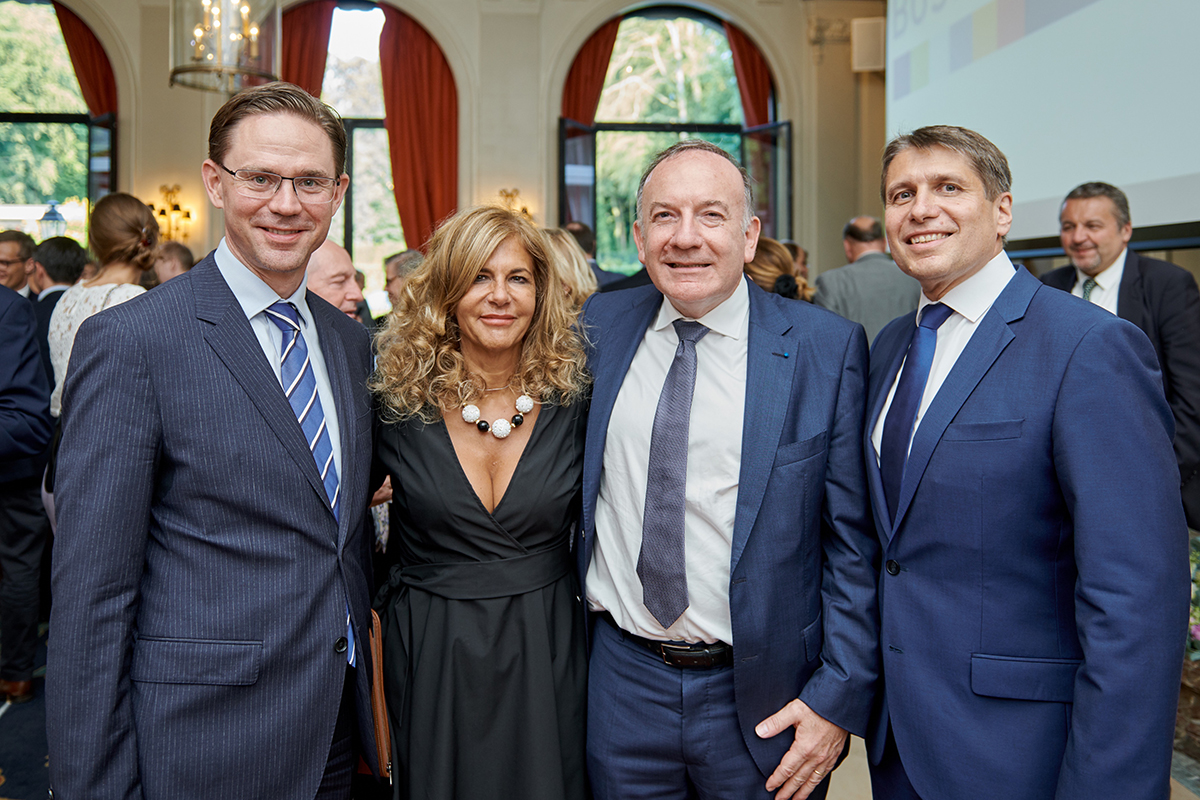
BusinessEurope member federations, together with guests from European associations and institutions, gathered on 12 July in Brussels to thank the outgoing President Emma Marcegaglia and welcome her successor, President Pierre Gattaz. During his first intervention as President of BusinessEurope, Gattaz stressed that we might be at a turning point concerning Europe’s future and place in the world. “Companies are the keystone to build a stronger Europe, a more united Europe, an open Europe, a human Europe. Defending our European Union is a worthy cause”, he said. In his keynote speech, the Vice-President of the European Commission, Jyrki Katainen, warmly thanked Emma Marcegaglia for her commitment to defending free trade and European values and welcomed the similarity of the European vision of President Gattaz. Read the speeches of Emma Marcegaglia and Pierre Gattaz.
Contact: Daniele Olivieri
Our comment
China and Europe, are we moving closer?
By Luisa Santos, Director, International Relations
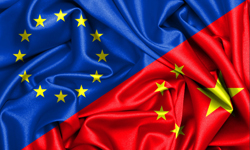 The EU-China Summit took place in Beijing this week. This annual gathering is a great opportunity to discuss the state of EU-China relations, talk about what is going well but also to address problems.
The EU-China Summit took place in Beijing this week. This annual gathering is a great opportunity to discuss the state of EU-China relations, talk about what is going well but also to address problems.
This year is particularly challenging for world trade. The wave of tariff increases, measures and countermeasures with far-reaching impact in global value chains is equally affecting the EU and China. Neither the EU nor China want a trade war but we are being forced to reply and sustain what we believe are our legitimate rights according to the World Trade Organisation (WTO) rules.
China and Europe have largely benefited from trade and open markets. We have a shared interest in opposing protectionism and maintaining the multilateral trading system that is not perfect but is best to avoid chaos. More than ever we have strong responsibilities in proposing reforms, convincing other important trading partners that the multilateral trading system can be improved for the benefit of all. China and the EU have a strong and mature relation but like the multilateral trading system it can also be improved.
We recognise China’s efforts to open its market to foreign investors and competition. But we are also concerned by long-standing and new barriers, for instance access to the internet and the new cybersecurity law, that prevent our relation from becoming more balanced and mutually beneficial.
China and the EU have been negotiating for some years a comprehensive agreement on investment that would solve some of these problems. We are eager to see these negotiations making real progress. A first market access offer exchange took place during the summit. This is a very positive sign to EU investors and to the markets.
China is implementing a far-reaching reform agenda that also includes strengthening its competitiveness in key manufacturing sectors through the China Manufacturing 2025 initiative and reinforcing China’s presence abroad through investments and the Belt and Road Initiative.
European business wants to contribute positively to this process. We are ready to engage with China and make these initiatives win-win. But China should involve European companies from an early stage using transparent processes and clear rules. Equal access and level playing field are key to make this reform a success.
There are opportunities for China and the EU to move closer. We just need to find ways of making our relation more balanced and beneficial for both sides.
Contact: Luisa Santos
Facts & Figures
DG Markus J. Beyrer welcomes Austrian Presidency’s approach to competitiveness in the EU
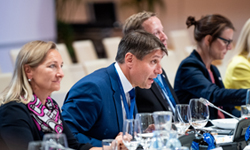 As part of the informal Competitiveness Council, the economy and industry ministers from the 28 EU Member States met in Vienna on Monday 16 July to discuss the future of European industrial policy. Held under the motto “Rethinking European Industry”, the event focused on innovation, digitalisation, artificial intelligence and professional education. “We appreciate the future-oriented approach of the Austrian Presidency to secure prosperity and competitiveness through smart digitisation. We need a common effort to strengthen the EU's research and innovation capacity”, said Director General Markus J. Beyrer. He welcomed the Presidency’s ambition to issue a presidency paper on the future vision for a new industrial policy.
As part of the informal Competitiveness Council, the economy and industry ministers from the 28 EU Member States met in Vienna on Monday 16 July to discuss the future of European industrial policy. Held under the motto “Rethinking European Industry”, the event focused on innovation, digitalisation, artificial intelligence and professional education. “We appreciate the future-oriented approach of the Austrian Presidency to secure prosperity and competitiveness through smart digitisation. We need a common effort to strengthen the EU's research and innovation capacity”, said Director General Markus J. Beyrer. He welcomed the Presidency’s ambition to issue a presidency paper on the future vision for a new industrial policy.
Contact: Asdin El Habbassi
Photo copyright: P. J. Hartberger
EU and Japan strong message to the world: we believe in trade
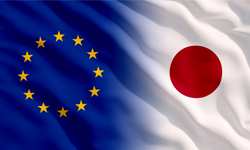 By signing the Economic Partnership Agreement on 17 July, the EU and Japan sent a clear message to the world that trade is about market opening and win-win relations, as trade agreements need to be beneficial for both sides, promoting closer cooperation and stronger relations between the signatories. BusinessEurope believes that this agreement will open up many economic opportunities, reaffirming the EU as a strong proponent of trade liberalisation and a defender of rules-based trade. Besides tariff liberalisation, the agreement will remove longstanding non-tariff barriers. It contains ambitious commitments to improve access to public procurement and it will protect geographical indications for food products, improve market access for services and assist small and medium-sized enterprises (SMEs) in making use of trade and investment opportunities. A swift ratification will ensure that companies and citizens will be able to benefit from the agreement as early as possible.
By signing the Economic Partnership Agreement on 17 July, the EU and Japan sent a clear message to the world that trade is about market opening and win-win relations, as trade agreements need to be beneficial for both sides, promoting closer cooperation and stronger relations between the signatories. BusinessEurope believes that this agreement will open up many economic opportunities, reaffirming the EU as a strong proponent of trade liberalisation and a defender of rules-based trade. Besides tariff liberalisation, the agreement will remove longstanding non-tariff barriers. It contains ambitious commitments to improve access to public procurement and it will protect geographical indications for food products, improve market access for services and assist small and medium-sized enterprises (SMEs) in making use of trade and investment opportunities. A swift ratification will ensure that companies and citizens will be able to benefit from the agreement as early as possible.
Contact: Maurice Fermont
Horizon Europe: need to increase budget and boost collaborative research
 Horizon Europe is a unique opportunity to deepen Europe’s innovation capability, playing a crucial role in leveraging private investments that are indispensable to finance far-reaching research and innovation projects in Europe. BusinessEurope, in a new position paper, acknowledges the European Commission’s efforts to present an ambitious programme that builds upon Horizon 2020 lessons. However, we highlight ten points, in particular that the total budget proposed is not enough and €120 billion is the bare minimum. To live up to the high ambitions, an increase in the pillar 2 budget to a minimum of 60% of the total budget is required to strengthen economic leadership and address global challenges. Only then can the promotion and facilitation of a collaborative approach with all actors of the research and innovation value chain be secured.
Horizon Europe is a unique opportunity to deepen Europe’s innovation capability, playing a crucial role in leveraging private investments that are indispensable to finance far-reaching research and innovation projects in Europe. BusinessEurope, in a new position paper, acknowledges the European Commission’s efforts to present an ambitious programme that builds upon Horizon 2020 lessons. However, we highlight ten points, in particular that the total budget proposed is not enough and €120 billion is the bare minimum. To live up to the high ambitions, an increase in the pillar 2 budget to a minimum of 60% of the total budget is required to strengthen economic leadership and address global challenges. Only then can the promotion and facilitation of a collaborative approach with all actors of the research and innovation value chain be secured.
![]() Contact: Alexandre Affre
Contact: Alexandre Affre
Reaping the benefits of digitalisation for companies, workers and society at large
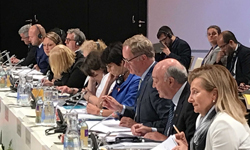 The digital transformation can lead to more job creation and open up employment, so we have to grasp the opportunities for employers and workers alike. This was the key message of the Chair of BusinessEurope Social Affairs Committee, José Maria Lacasa, at the informal Employment and Social Affairs Council in Vienna on 19 June. He stressed that Member States have the main role to tackle challenges emerging from digitalisation in terms of labour law, access to social protection and particularly digital skills. This needs to be done across Europe in a coherent way, fully respecting social partners’ autonomy. Lacasa also called for a “fact-based debate” and to “dispel the fears about work being displaced by new technologies”. In terms of solutions, he called for EU and national policy to embrace technological change in a way which is ethical and human and to adapt our labour markets, education and training systems and work organisation so they are fit for the digital transformation.
The digital transformation can lead to more job creation and open up employment, so we have to grasp the opportunities for employers and workers alike. This was the key message of the Chair of BusinessEurope Social Affairs Committee, José Maria Lacasa, at the informal Employment and Social Affairs Council in Vienna on 19 June. He stressed that Member States have the main role to tackle challenges emerging from digitalisation in terms of labour law, access to social protection and particularly digital skills. This needs to be done across Europe in a coherent way, fully respecting social partners’ autonomy. Lacasa also called for a “fact-based debate” and to “dispel the fears about work being displaced by new technologies”. In terms of solutions, he called for EU and national policy to embrace technological change in a way which is ethical and human and to adapt our labour markets, education and training systems and work organisation so they are fit for the digital transformation.
Contact: Rebekah Smith
Position paper adopted on the Taxation of the Digital Economy
 In response to the European Commission’s recent proposals, BusinessEurope has communicated its recently adopted position paper on the taxation of the digital economy to relevant Commissioners and Members of the European Parliament (MEPs). BusinessEurope believes that agreements on changes to international tax rules regarding the digitalised economy should take place at the global level and we therefore welcome the European Commission’s efforts to find a global solution and believe discussions at international level should be intensified. However, the position paper argues that the proposal for a Digital Services Tax (DST) breaks with the international convention of taxing company profits and not revenue, and thus risks increasing double taxation of companies. It is noted in the position paper as well that whilst allowing the Organisation for Economic Co-operation and Development (OECD) a reasonable opportunity to reach a global agreement, the European Commission should, in parallel, to its joint and continued efforts with the OECD, undertake a thorough analysis with a view to identifying ways forward for the EU to address any clearly identified distortions in the taxation of the profits of digital and non-digital businesses, without undermining the competitiveness of EU industry. You can read the position paper in full here.
In response to the European Commission’s recent proposals, BusinessEurope has communicated its recently adopted position paper on the taxation of the digital economy to relevant Commissioners and Members of the European Parliament (MEPs). BusinessEurope believes that agreements on changes to international tax rules regarding the digitalised economy should take place at the global level and we therefore welcome the European Commission’s efforts to find a global solution and believe discussions at international level should be intensified. However, the position paper argues that the proposal for a Digital Services Tax (DST) breaks with the international convention of taxing company profits and not revenue, and thus risks increasing double taxation of companies. It is noted in the position paper as well that whilst allowing the Organisation for Economic Co-operation and Development (OECD) a reasonable opportunity to reach a global agreement, the European Commission should, in parallel, to its joint and continued efforts with the OECD, undertake a thorough analysis with a view to identifying ways forward for the EU to address any clearly identified distortions in the taxation of the profits of digital and non-digital businesses, without undermining the competitiveness of EU industry. You can read the position paper in full here.
![]() Contact: Pieter Baert
Contact: Pieter Baert
Calendar
- 24 July: ECOFIN Council (Budget)
- 25 July: European Commission President Juncker travels to Washington D.C.
- 21 August: End of 3rd Greek economic adjustment programme
- 6 September: Your next edition of Headlines
Reminder: please take a look at our revised privacy policy
